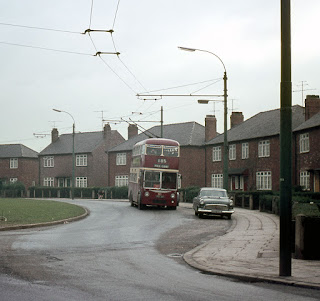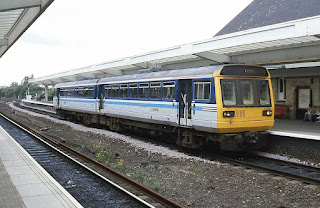I left you on the South Bank of the Tees and here is a bit more of the industry once to be found there.
The trolleybuses of the former Teesside Railess Traction Board (TRTB) could be found passing the steel works in 1969 (Les Flint).
A Sentinel shunter in the sidngs there in 1967.
Another loco in the steelworks sidings in 1979.
Normanby Ironworks, South Bank - a postcard view.
More TRTB trolleybuses, at Cargo Fleet, 1968 (Les Flint).
The last day 4th April 1971, near the depot (Les Flint).
TRTB had its depot at Cargo Fleet, seen here in August 1962 (Les Flint).
Cleveland Transit continued to use Cargo Fleet depot, as seen in 1981.
A newly introduced TRTB trolleybus at North Ormesby around 1919.
More TRTB trolleybuses in North Ormesby, in Teesside Municipal Transport livery, March 1971 (Les Flint).
Nunthorpe station, on the NER Middlesbrough to Battersby line.
The signal box at Nunthorpe was still in use in 1979.
Now, we head to Old Eston and TRTB trolleybus 16 was found there on an enthusiast's tour in 1968 (Les Flint).
Reading trolleybus 185 made a tour of the system in 1969 and is seen at Old Eston (Les Flint).
Eston once had its own NER station.
There were various lines serving industry around Eston. This is New Bank Incline.
We now head back towards the Tees, finding more steelworks and coke ovens as we approach Redcar. These locos, out of use, served the latter.
The Redcar Steelworks, when open, had a loco depot at Warrenby.
EWS 56060 is seen near Warrenby.
Now we reach Redcar itself, a pleasant seaside town. Here's an old postcard from the '50s.
The sea front at Redcar.
On the shore, lots of birds. These are turnstones and they get on well with their human neighbours.
The boating lake, another of Redcar's attractions.
Redcar Central station, on a foul day in 1987.
By 2018, it had been remodelled.
This signal box controlled the regular freight trains.
All buses in Redcar head for the Clock Tower.
Arriva is today's main operator.
The Pig & Whistle was demolished in 2001.
The Central Hotel is now "long term closed". A shame as it was a good boozer.
The Gypsy Rover will save the day. Two real ales in this micropub.
Out near the race course, the Yorkshire Coble, owned by Samuel Smiths. No real ale these days.
Even further out of town, the Turners Mill, a good place to conclude at.
Next time: We descend upon Marske and Saltburn. Follow the route here.






































































